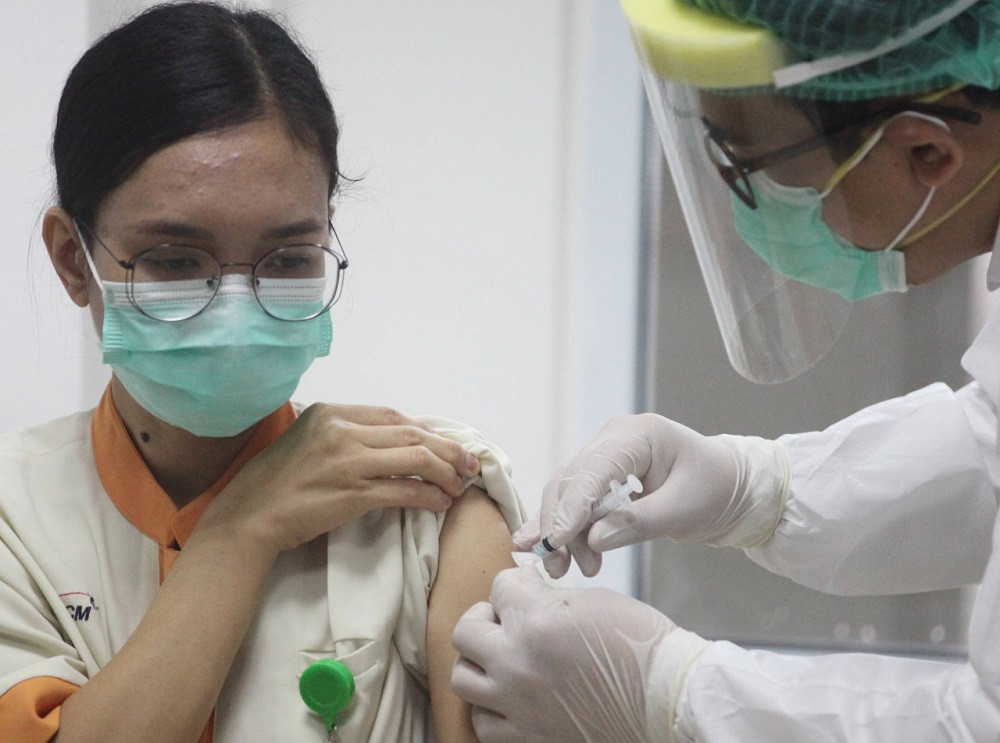Popular Reads
Top Results
Can't find what you're looking for?
View all search resultsPopular Reads
Top Results
Can't find what you're looking for?
View all search resultsIndonesia against ‘vaccine nationalism’
World will not recuperate unless all countries recover: Retno
Change text size
Gift Premium Articles
to Anyone
I
ndonesia has urged the world to not resort to "vaccine nationalism", which it says could limit the global availability of COVID-19 vaccines, after a recent procurement row broke out in Europe.
Foreign Minister Retno Marsudi said during an online panel organized by the World Economic Forum (WEF) on Friday that equitable and fair access to vaccines was important not just for developing and least developed countries, but also for developed countries. She said the world would not truly recover from COVID-19 unless all countries recovered.
“So please stop the politicization of vaccines; please stop vaccine nationalism. And we must remind ourselves that vaccines are a humanitarian issue; vaccines are not a political issue,” Retno said.
Indonesia has promoted multilateralism in the search for solutions to the global health crisis as a means to keep nationalism and protectionism at bay.
Retno herself is one of three cochairs of the GAVI COVAX Advance Market Commitment (AMC), a multilateral COVID-19 vaccine initiative she cited as the type of effort “we need to continuously strengthen" to ensure both rich and poor countries received vaccines simultaneously. The AMC is part of an international collaborative effort called the COVAX Facility, which is seeking to pool and distribute some 2 billion vaccine doses throughout world. Through the program, Indonesia could receive 13 million to 23 million doses of the AstraZeneca vaccine.
Read also: Jokowi calls for equal vaccine access in UNGA address
On Saturday, Retno spoke with Seth Berkley of the GAVI vaccine alliance, one of founders of the COVAX Facility, about the rise of vaccine nationalism and its potential to inhibit multilateral vaccine cooperation.
Last week, the European Union announced it would tighten rules on the export of COVID-19 vaccines produced in the region as “an insurance policy” for the vaccines it had bought in advance, Reuters reported. The plan came after the EU publicly criticized AstraZeneca for failing to deliver vaccine shots as promised. The EU plan has alarmed the United Kingdom in particular.
Read also: EU could ban vaccine exports under new checks
Vaccine supplies under the COVAX Facility and other multilateral efforts are exempt from the planned scheme, as are exports to certain countries. But some developed countries that have made advance purchases have voiced their concerns, including Japan and South Korea, whose officials raised the issue at the WEF panel on Friday evening.
“I'm concerned that the EU has announced that the EU may block the export of vaccines produced in Europe until sufficient amounts are provided to European people before they allow any export to the third countries,” said Japan’s Taro Kono, who is in charge of delivering vaccines to the country’s more than 120 million people.
Even though it was “understandable” for a country to put its own citizens first, he said, the move could disrupt the global supply chain and trigger “some kind of retaliation”.
Outgoing South Korean Foreign Minister Kang Kyung-wha asked why some governments were collecting vaccines “in volumes that were many times more than their population sizes [required]”, which she feared would exacerbate the uncertainty for the rest of the world.
With a population of only about 450 million, the EU has reserved almost 2.3 billion doses from six vaccine makers. But EU Ambassador to ASEAN Igor Driesmans defended the approach earlier this week, saying the advance purchases were to ensure that the EU had enough for its people.
"What we see for the time being in Europe is that there's very much a scarcity of vaccines," he said during a virtual press briefing on Thursday, adding that once the EU’s population was vaccinated, the surplus would be shared with other countries.
Read also: Data problems cast shadow over Indonesia's ambitious vaccine drive
Despite having been developed by various producers at an unprecedented speed, COVID-19 vaccines are scarce throughout the world, and only a few dozen countries have begun mass vaccination programs.
By Jan. 29, more than 91.22 million vaccine doses had been administered worldwide, with the United States leading the tally with 27.88 million doses, followed by China with 22.77 million doses, according to the Our World in Data project by the University of Oxford. The worldwide tally is equal to 1.2 doses for every 100 people.
As of Jan. 30, 482,145 first doses and 20,810 second doses of CoronaVac had been administered in Indonesia, according to the Health Ministry, about three weeks after the nation began its vaccination program. The figures represent a fraction of the country’s 260 million people.
Driesmans said he hoped all countries would “up their game and be more ambitious” in their funding for the COVAX Facility. He said about 50 percent of the program had been financed by the EU – a greater share than any other contributor, including China, the US, Japan and South Korea.










